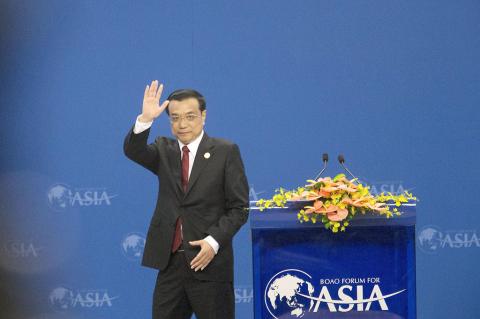China has announced plans to connect the stock exchanges of Hong Kong and Shanghai, allowing a combined 23.5 billion yuan (US$3.8 billion) of daily cross-border trading.
Investors will be able to trade 10.5 billion yuan of Hong Kong-listed stocks through the Shanghai exchange and 13 billion yuan of mainland China shares through Hong Kong, the China Securities Regulatory Commission said in a statement yesterday.
That is equivalent to about 21 percent of the average daily value of shares traded in Hong Kong over the past year, and 14 percent of daily trading on the Shanghai Composite Index, according to data compiled by Bloomberg.

Photo: Bloomberg
“The quota will have a significant impact on the Hong Kong market because it accounts for about a quarter or fifth of the daily turnover,” Delta Asia Securities Ltd strategist Sam Chi Yung (岑智勇) said.
“The quota amount is a starting point,” and may be increased, he said.
The aggregate quotas for the cross-border trading are 250 billion yuan for Hong Kong-listed stocks and 300 billion yuan for Shanghai shares, Hong Kong’s Securities and Futures Commission (SFC) said.
The limits may be adjusted in the future, and preparations for the link will take about six months, according to a statement from the regulator.
Connecting the exchanges will “further improve the opening and healthy development of capital markets in China and Hong Kong,” Chinese Premier Li Keqiang (李克強) said yesterday at the Boao Forum on China’s Hainan Island. Stocks with a primary listing in Shanghai have a market value of US$1.94 trillion, compared with US$3.56 trillion for Hong Kong, data compiled by Bloomberg showed.
Individual investors in mainland China need at least 500,000 yuan in their securities account to take part in the trading link, according to the SFC.
“This is good news for Hong Kong stocks,” Guotai Junan Securities Co (國泰君安證券) analyst Shirley Gu (古喬藝) said by telephone in Shenzhen. “It’s not about the quota now — the key is that the expectation is realized and this is now a certainty. This could attract new foreign investors and more active trading in Hong Kong.”
Mutual access would boost trading volumes and improve profitability for Hong Kong’s exchange, AMTD Financial Planning Ltd (尚乘財富) general manager Kenny Tang (鄧聲興) said.
It would also help the Shanghai market in the long run as foreign investors buy cheap shares, while mainland Chinese individuals would have the option to invest in Hong Kong stocks, Tang said.

‘SWASTICAR’: Tesla CEO Elon Musk’s close association with Donald Trump has prompted opponents to brand him a ‘Nazi’ and resulted in a dramatic drop in sales Demonstrators descended on Tesla Inc dealerships across the US, and in Europe and Canada on Saturday to protest company chief Elon Musk, who has amassed extraordinary power as a top adviser to US President Donald Trump. Waving signs with messages such as “Musk is stealing our money” and “Reclaim our country,” the protests largely took place peacefully following fiery episodes of vandalism on Tesla vehicles, dealerships and other facilities in recent weeks that US officials have denounced as terrorism. Hundreds rallied on Saturday outside the Tesla dealership in Manhattan. Some blasted Musk, the world’s richest man, while others demanded the shuttering of his

ADVERSARIES: The new list includes 11 entities in China and one in Taiwan, which is a local branch of Chinese cloud computing firm Inspur Group The US added dozens of entities to a trade blacklist on Tuesday, the US Department of Commerce said, in part to disrupt Beijing’s artificial intelligence (AI) and advanced computing capabilities. The action affects 80 entities from countries including China, the United Arab Emirates and Iran, with the commerce department citing their “activities contrary to US national security and foreign policy.” Those added to the “entity list” are restricted from obtaining US items and technologies without government authorization. “We will not allow adversaries to exploit American technology to bolster their own militaries and threaten American lives,” US Secretary of Commerce Howard Lutnick said. The entities

Taiwan’s official purchasing managers’ index (PMI) last month rose 0.2 percentage points to 54.2, in a second consecutive month of expansion, thanks to front-loading demand intended to avoid potential US tariff hikes, the Chung-Hua Institution for Economic Research (CIER, 中華經濟研究院) said yesterday. While short-term demand appeared robust, uncertainties rose due to US President Donald Trump’s unpredictable trade policy, CIER president Lien Hsien-ming (連賢明) told a news conference in Taipei. Taiwan’s economy this year would be characterized by high-level fluctuations and the volatility would be wilder than most expect, Lien said Demand for electronics, particularly semiconductors, continues to benefit from US technology giants’ effort

Minister of Finance Chuang Tsui-yun (莊翠雲) yesterday told lawmakers that she “would not speculate,” but a “response plan” has been prepared in case Taiwan is targeted by US President Donald Trump’s reciprocal tariffs, which are to be announced on Wednesday next week. The Trump administration, including US Secretary of the Treasury Scott Bessent, has said that much of the proposed reciprocal tariffs would focus on the 15 countries that have the highest trade surpluses with the US. Bessent has referred to those countries as the “dirty 15,” but has not named them. Last year, Taiwan’s US$73.9 billion trade surplus with the US